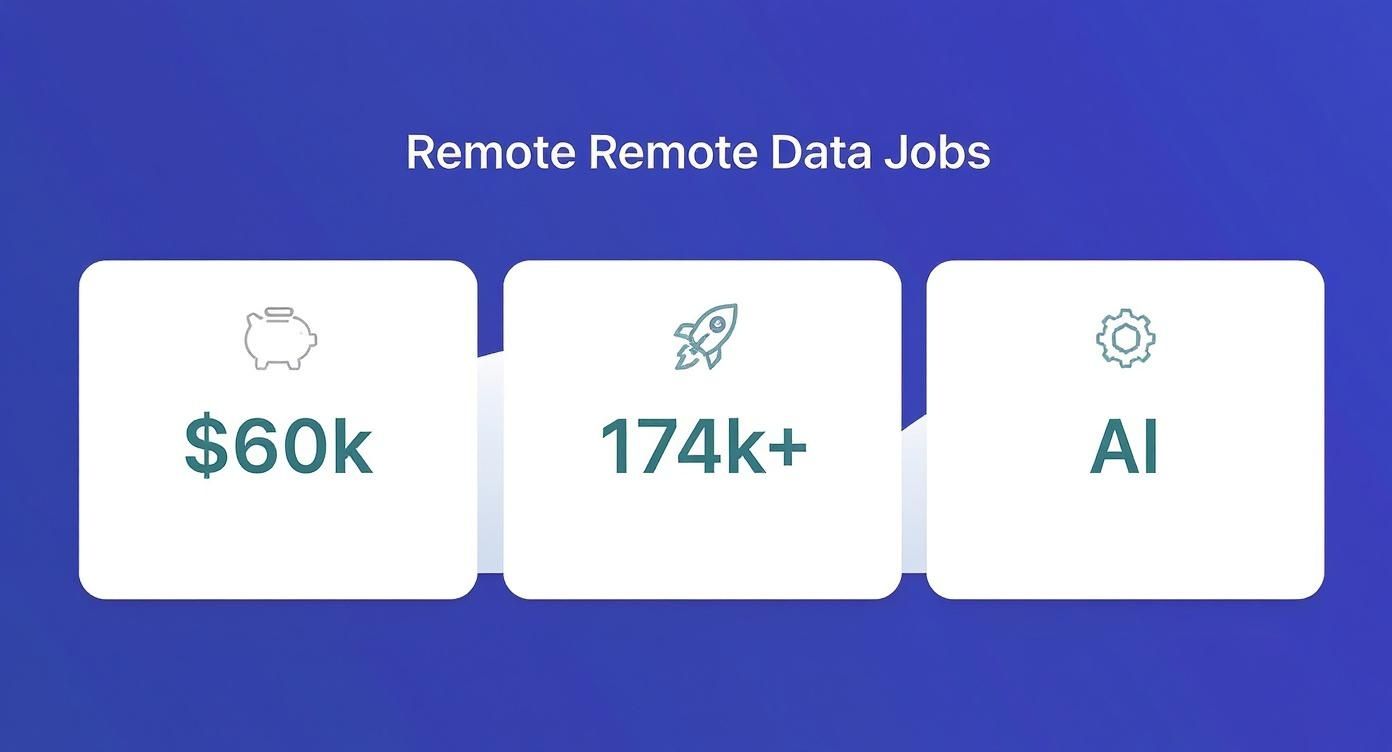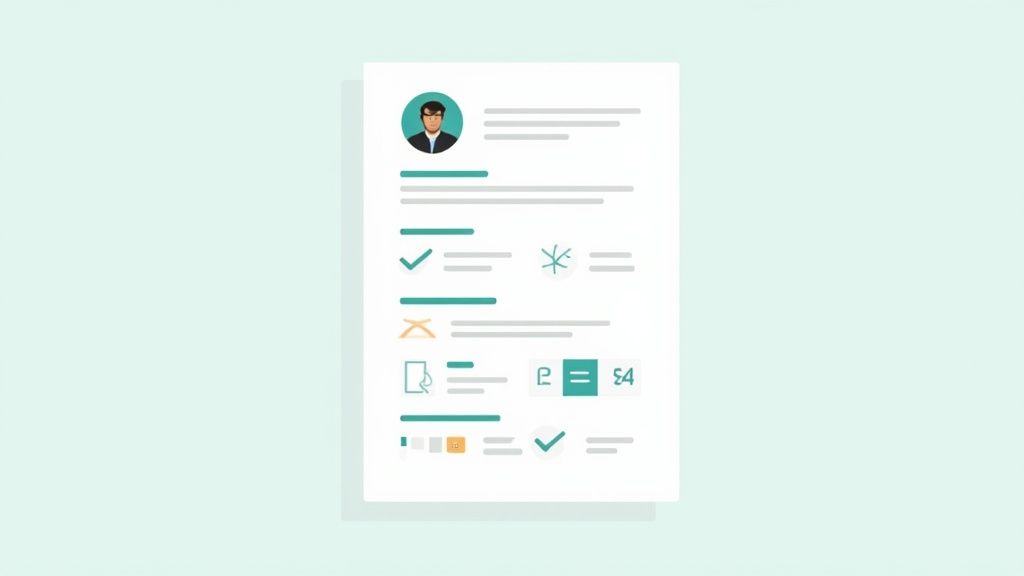You can absolutely land one of the many data jobs work from home, and the market is strong, with salaries for senior remote roles pushing past $174,000. Every business needs a data driven strategy to compete, making your skills in SQL, Python, and data visualization highly valuable, no matter where your desk is located.
This guide provides a step by step plan to help you find and land a top remote data job faster. We will cover the essential skills you need, where to find the best opportunities, and how to create a resume that gets you hired.
Understanding the Remote Data Job Market
The demand for skilled data professionals who can work from anywhere has never been higher. Companies now understand that data analysis is a core strategic function, not just an expense. This has made remote and hybrid work permanent options, which is great news for you. It means more opportunities to find a role that fits your life without limiting your career or salary.
However, the roles themselves are evolving. As AI begins to handle more routine data tasks, the focus is shifting from simple data processing to high level strategic thinking. Companies are not just looking for someone who can run a query. They need analysts and scientists who can explore complex datasets, explain their findings to non technical stakeholders, and drive business decisions.
Core Skills for Remote Success
To succeed in a remote data job, you need more than just technical ability. In a distributed team, certain soft skills are essential for success.
- Self Discipline and Autonomy: This is the foundation of remote work. You must be able to manage your schedule, prioritize tasks, and meet deadlines without constant supervision.
- Proactive Communication: Clear and concise communication on platforms like Slack, Teams, and email is critical. This means providing regular project updates and knowing when to ask for help before a small issue becomes a major problem.
- Technical Mastery: A strong foundation in SQL for data extraction, Python or R for analysis, and tools like Tableau or Power BI for visualization is a must have. Your ability to work independently with this stack is a key indicator of your remote readiness.
The infographic below breaks down the salary potential, job growth, and the growing influence of AI in the remote data world.

This data shows a clear career path with significant earning potential, from entry level roles to senior level compensation. Remote data jobs are a stable, long term career choice, not a temporary trend.
Salary Benchmarks and Market Realities
Knowing the market salary data is key to negotiating your offer with confidence. The remote data analyst market is expected to grow significantly through 2025. Salaries vary widely based on experience, typically starting around $60,000 for entry level positions and climbing above $174,000 for senior or lead analysts.
This wide range highlights the economic opportunity that remote work offers, giving you access to high paying jobs regardless of your local market conditions.
A successful remote data professional acts like an internal consultant. They do not just answer questions. They anticipate business needs, find the data to address them, and present solutions that drive action.
To fully understand the market, you should also consider broader trends, including the impact of AI on job replacement. As you prepare for your job search, build a resume that showcases not just your technical skills but also your ability to think strategically and solve problems independently. This is the combination that top employers are looking for right now.
How to Find High-Quality Remote Data Opportunities
Forget endlessly scrolling on generic job boards. The best remote data roles are found on niche platforms and professional networks where companies look for specialized talent. To stop wasting time, you need to focus your search where serious employers are already looking for you.
And they are looking. According to the U.S. Bureau of Labor Statistics, data analyst roles are projected to grow by 23% through 2032. While some headlines suggest remote work is declining, the data tells a different story. Up to 8% of data jobs do not specify a location, and hybrid models are becoming standard.
The salaries reflect this demand. Data analysts with 4 to 6 years of experience earn an average of $109,000. The opportunities are available, but you need a strategic approach to find them.

Target the Right Job Titles
To find the best roles, you need to use the same language recruiters use. Job titles that seem similar can involve very different day to day responsibilities. Targeting the right titles is the first step in a successful search for data jobs work from home.
For example, a Data Analyst often acts as a detective, using SQL and tools like Tableau to investigate historical data and answer specific business questions. A Business Intelligence Analyst might be more of an architect, building and maintaining dashboards that track company wide performance metrics. A Data Scientist is expected to use advanced skills in Python, statistics, and machine learning to build predictive models.
Your strategy should be to search for multiple job titles that align with your core skills. This simple change can double or triple the number of relevant opportunities you uncover. Do not limit yourself to just one title.
To help you get started, here are some of the most common remote friendly data job titles and their typical requirements.
Top Remote-Friendly Data Job Titles
This table breaks down common job titles for remote data professionals, along with the core responsibilities and skills required for each. Use it to identify which roles best fit your background and target your search more effectively.
Understanding these differences ensures you apply for jobs where your skills will be most valued, rather than trying to fit into a role that is not the right match.
Use Niche Job Boards and Networks
General job sites can feel like searching for a needle in a haystack. The best opportunities are on niche platforms designed for data professionals. These sites attract high quality employers who are serious about hiring top remote talent.
- LinkedIn Jobs: An essential tool for your search. Its filters for "Remote" and specific skills like "SQL" or "Python" are very effective. Set up job alerts here, as many top roles are posted directly by recruiters active on the platform.
- Built In: A great resource for tech and data jobs, especially if you are interested in startups or established tech companies that have embraced remote work.
- Jobsolv: We built our platform specifically for data professionals. You can browse thousands of curated remote job listings and use our tools to tailor your resume for each application in minutes, saving you hours of work.
By focusing your energy on these specialized channels, you can move from a broad, frustrating search to a targeted, strategic one. You will spend less time sifting through irrelevant posts and more time applying to high quality data jobs work from home that are a genuine match for your expertise.
Crafting a Resume That Lands Remote Data Roles
Your resume is your first impression, and for a remote data role, it needs to be strong. It must do more than list your skills; it must prove you can deliver results from any location. This means creating a document that impresses a hiring manager and passes through the Applicant Tracking Systems (ATS) that most companies use.
The goal is to shift the focus from your daily tasks to your measurable achievements. A hiring manager does not just want to know you ran SQL queries. They want to know how your analysis of that data drove business results. This is especially true for data jobs work from home, where managers need to see that you are a self starter who can achieve goals without direct supervision.
Highlighting Remote Readiness Through Impact Metrics
To get noticed, you must quantify your accomplishments. Instead of just saying you "created Tableau dashboards," explain the outcome. Did those dashboards provide the marketing team with insights that helped increase lead conversion by 15%? This is the type of result that gets you an interview.
Your resume should tell a story about the value you create. Frame your experience around the problems you have solved. Think about projects where you took the lead, worked with a distributed team, or managed your workload with minimal oversight.
- Before: "Wrote complex SQL queries to extract data from multiple databases."
- After: "Optimized SQL queries, reducing report generation time by 40% and enabling real time performance tracking for the sales team."
The "after" example demonstrates technical skill, an efficiency mindset, and a direct link to business value. These are all critical signals for a strong remote candidate. For a deeper dive, check out our guide on the best data analyst resume that got 5 interviews in a week.
Getting Past the Robots: Optimizing for ATS
Before a human ever sees your resume, an ATS will scan it. If your resume is not formatted correctly or lacks the right keywords, it will be filtered out. This is a crucial step for anyone seeking data jobs from home, as nearly every large company uses this software.
Your resume has two audiences: the machine and the human. You have to write for both. The ATS looks for keyword matches, while the recruiter looks for proof of your accomplishments.
The key is to mirror the language in the job description. If a posting repeatedly mentions "Power BI," "ETL processes," and "stakeholder communication," those exact phrases should appear in your resume where relevant.
Jobsolv's Free ATS Approved Resume Builder eliminates the guesswork. It helps you build a perfectly formatted resume designed to pass these automated checks. You can then use our tailoring tool to instantly match your experience with the specific keywords in any job description, ensuring your application is seen by a real person.
Structuring Your Experience for Maximum Impact
How you write your bullet points is just as important as what you write. A powerful formula is to describe the action you took, the tools you used, and the quantifiable result you achieved.
Example: Data Analyst Experience
- Developed and automated a suite of Tableau dashboards to monitor customer churn, providing leadership with actionable insights that contributed to a 10% reduction in quarterly attrition.
- Engineered and maintained ETL pipelines using Python and SQL, processing over 50 GB of raw data daily to support business intelligence initiatives.
- Collaborated with a fully remote, cross functional team to define key performance indicators (KPIs) for a new product launch, leading to a data driven marketing strategy.
Each point is specific, contains relevant keywords, and is tied to a clear business outcome. This structure proves you have both the technical skills and business acumen to succeed in an autonomous role. It shows you do not just handle data; you use it to make a real impact.
Navigating the Remote Interview Process
Interviewing for a remote data role is different from a traditional interview. It is not just about proving your technical knowledge; you also have to show that you can be a productive and collaborative team member from a distance. Success requires a specific strategy, from your technical setup to how you communicate your work style.
Remote interview processes often move faster than in person ones, with multiple video rounds scheduled in a short timeframe. You must be prepared to demonstrate your value quickly, showing you have both the technical skills and the self discipline to excel without direct supervision.

Preparing Your Environment for a Flawless Interview
Your interview environment sends a strong message about your professionalism. A messy background or a poor internet connection can be a major distraction and may suggest a lack of attention to detail, a critical flaw for any data professional.
Before your call, use this simple checklist to ensure everything runs smoothly.
- Test Your Tech: At least 30 minutes before the interview, check your camera, microphone, and internet connection. Use the same platform (Zoom, Google Meet, Teams) to avoid last minute surprises.
- Create a Professional Backdrop: Choose a clean, uncluttered background. A simple wall or a tidy bookshelf works well. If you use a virtual background, make sure it is professional.
- Eliminate Distractions: Inform your family or roommates about your interview schedule. Close all unnecessary tabs on your computer and silence your phone.
- Optimize Your Lighting: Position your main light source in front of you, not behind you. This simple adjustment prevents you from appearing as a silhouette and allows the interviewer to see you clearly.
For a deeper dive, check out these tips for a successful remote job interview. A little preparation can make a big difference in your first impression.
Answering Remote-Specific Questions
Hiring managers need to be confident that you can thrive without direct supervision. They will ask questions designed to assess your communication habits, time management skills, and ability to collaborate with a distributed team. Prepare thoughtful, specific answers to these questions.
Question: “How do you handle communication with a distributed team across different time zones?”
Weak Answer: “I’m good with email and Slack.”
Strong Answer: “I prioritize asynchronous communication to respect everyone's focus time. For my team in a different time zone, I send a detailed daily summary with my progress, any blockers, and next steps before I log off. For urgent issues, I use tagged messages in our shared Slack channel, and I’m flexible with my schedule to overlap for critical real time meetings when needed.”
The strong answer provides a concrete strategy. It shows you already have a system in place, which is exactly what hiring managers are looking for.
Conquering Remote Technical Assessments
Technical assessments for data jobs work from home are designed to test your practical skills in a remote setting. These usually take the form of a live coding challenge or a take home project.
A live coding challenge involves sharing your screen and solving SQL problems or Python data tasks while the interviewer observes. They are evaluating your thought process, not just looking for the right answer. Talk them through your approach as you work, explaining why you chose a particular function or how you plan to structure a query.
A take home project provides you with a dataset and a business problem to solve within a specific timeframe, usually 24 to 72 hours. This format directly tests your ability to manage a project independently from start to finish.
- Understand the Goal: Read the instructions carefully to ensure you are solving the correct problem.
- Show Your Work: Your code and methodology should be well documented. Clearly explain your assumptions and the steps you took to reach your solution.
- Present Your Findings: Deliver your results in a clean, professional format, such as a Jupyter Notebook or a short slide deck, as if you were presenting to stakeholders.
These assessments are your opportunity to prove you can deliver high quality technical work without supervision. Prepare for these formats, and you will confidently show that you are the ideal candidate for a remote data role.
Negotiating Your Remote Salary and Benefits

Receiving a job offer is a major accomplishment, but one critical step remains: negotiating a compensation package that reflects your true value. This is especially important for remote roles, where the conversation extends beyond base salary to include benefits that can significantly impact your work from home experience.
You have leverage in this negotiation. The shift to flexible work is a permanent feature of the modern workplace. According to research on remote work statistics and trends, hybrid job postings for roles like data analyst are projected to increase from 15% in Q2 2023 to 24% by Q2 2025, while on site roles are declining.
Build a Data-Driven Case for Your Salary
Just like in your data analysis work, you need to approach this negotiation with solid evidence. Your goal is to build an objective, data backed argument for the salary you are requesting. This removes emotion from the conversation and frames your request as a logical business decision.
Start by researching salary benchmarks. Use credible sources to find the typical pay range for your specific role, experience level, and the company's industry. For remote jobs, it is crucial to clarify whether the company's pay is based on its headquarters' location, a national average, or your local cost of living. This detail can completely change your negotiation strategy.
Your value is not just your technical skillset; it is the measurable impact you can create. Tie your salary request directly to the value you demonstrated in your interviews, such as your ability to increase efficiency or drive revenue.
Once you have the market data, connect it directly to your accomplishments. For example, you could say, "Based on my research, the market rate for a Senior Data Analyst in this sector is between X and Y. Given my experience in reducing data processing times by 30% at my last company, I believe a salary at the upper end of this range is appropriate." For more tactics, review our guide on effective remote job salary negotiation strategies.
Negotiate Beyond the Base Salary
A strong remote offer includes more than just a paycheck. The right benefits can make a significant difference in your work life balance and productivity. Do not hesitate to negotiate these perks, as they often have more flexibility than the base salary.
Consider what you need to be successful and comfortable in a home office. Many companies now offer stipends or reimbursements for essential equipment, and it is worth asking about them.
Beyond salary, it is smart to explore the full range of benefits that impact your day to day as a remote employee. The table below outlines some key areas you can negotiate.
Negotiable Items in a Remote Job Offer
Negotiating these points is not just about getting more benefits. It shows that you are thinking strategically about your long term success in the role.
These benefits are essential components of a modern compensation package for data jobs work from home, demonstrating that an employer is genuinely invested in your well being and success as a remote team member.
Common Questions About Remote Data Jobs
Navigating the remote job market can bring up many questions. Getting clear answers is the first step toward building a successful job search strategy. Here are some of the most common challenges data professionals face, with practical advice you can use today.
The shift to remote work has created more opportunities, but it has also increased the competition. Understanding how this changes the job search process is critical.
How Competitive Are Remote Data Jobs, Really?
Yes, the competition for data jobs work from home is intense. When a company posts a remote role, they receive applications from across the country and sometimes the world. It is common for a fully remote data analyst position to receive hundreds of applications within the first 48 hours.
However, a high number of applicants does not mean they are all qualified. Many candidates apply with mismatched skills, hoping something will work out. Your real competition is a much smaller group of professionals who have the right skills and know how to present them effectively.
The key to success is not just being skilled but also being strategic. A perfectly tailored resume and a compelling narrative about the value you deliver will always stand out from the crowd.
What If I Don’t Have Direct Remote Work Experience?
This is a common concern, but it is rarely a deal breaker. Most hiring managers understand that not everyone has held a formal "remote" title before. What they truly care about is whether you can work independently, manage your time effectively, and communicate clearly without direct supervision.
You can demonstrate these skills without having a remote job on your resume. It is all about how you frame your experience.
- Highlight Project Ownership: Discuss projects where you took the lead from start to finish with minimal supervision.
- Showcase Communication Skills: Mention instances where you collaborated with teams or clients in different offices or time zones. This is a form of remote collaboration.
- Emphasize Self Management: Describe how you prioritize tasks and meet deadlines in a dynamic environment.
Instead of just saying you worked on a project, explain how you independently drove that project to completion, providing regular async updates to your team along the way.
Your goal is to prove you possess the qualities of a successful remote employee. This matters far more than having the "remote" label on your resume.
How Can I Stand Out in a Global Talent Pool?
In a large pool of applicants, being a generalist is not enough. Having solid SQL and Python skills is now a baseline expectation, not a differentiator. You need to build a professional brand that highlights your expertise.
- Specialize in a Niche: Do not be a generic data analyst. Become the go to expert in marketing analytics, financial modeling, or supply chain data. Specializing immediately reduces your competition.
- Create a Killer Portfolio: A portfolio is essential. It is the most powerful tool you have to showcase your abilities. Include detailed case studies, code snippets, and clear visuals that explain the business problem you solved. This provides concrete proof that you can do the job.
- Quantify Your Impact: Every bullet point on your resume should answer the question, "So what?" Connect your work to real business outcomes, such as cutting costs, increasing revenue, or improving efficiency. Numbers speak volumes.
Ultimately, you stand out by being more strategic than other candidates. Tailor every application, network with professionals in your target industry, and commit to continuous learning. This approach will always place you ahead of those who are simply mass applying to every open role.
Ready to find your next remote data role without the hassle? Jobsolv provides the tools you need to succeed. Use our free ATS approved resume builder to create a perfect resume, then instantly tailor it for any job description. Browse thousands of curated remote and hybrid data jobs and apply with confidence. Start your smarter job search today at https://www.jobsolv.com.
Article created using Outrank
.svg)















